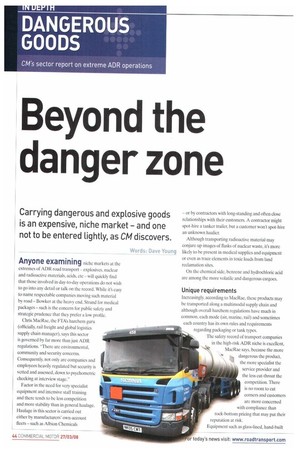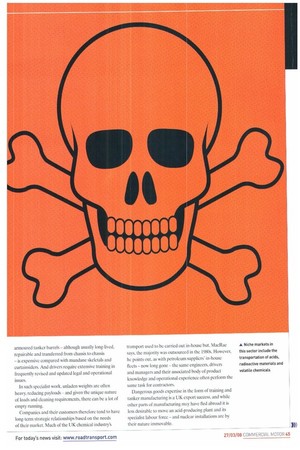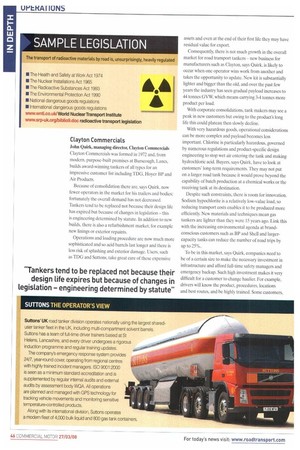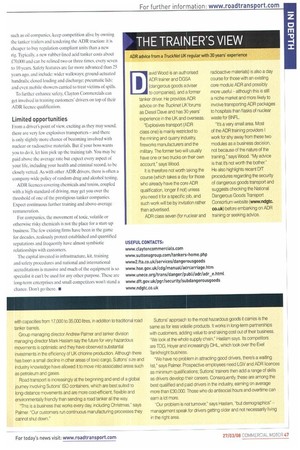Beyond the danger zone
Page 44

Page 45

Page 46

Page 47

If you've noticed an error in this article please click here to report it so we can fix it.
Carrying dangerous and explosive goods is an expensive, niche market and one not to be entered lightly, as CM discovers.
Words: Dave Young
Anyone examining niche markets at the extremes of ADR road transport explosives, nuclear and radioactive materials, acids, etc will quickly find that those involved in day-to-day operations do not wish to go into any detail or talk on the record. While it's easy to name respectable companies moving such material by road Bowker at the heavy end. Strand for medical packages such is the concern for public safety and strategic prudence that they prefer a low profile.
Chris MacRae, the FTA's hazchem guru (officially, rail freight and global logistics supply chain manager), says this sector is governed by far more than just ADR regulations. "There are environmental, community and security concerns. Consequently, not only are companies and employees heavily regulated but security is vetted and assessed, down to psychometric checking at interview stage."
Factor in the need for very specialist equipment and intensive staff training and there tends to be less competition and more stability than in general haulage. Haulage in this sector is carried out either by manufacturers' own-account fleets such as Albion Chemicals or by contractors with long-standing and often close relationships with their customers. A contractor might spot-hire a tanker trailer, but a customer won't spot-hire an unknown haulier.
Although transporting radioactive material may conjure up images of flasks of nuclear waste, it's more likely to be present in medical supplies and equipment or even as trace elements in toxic loads from land reclamation sites.
On the chemical side, benzene and hydrochloric acid are among the more volatile and dangerous cargoes.
Unique requirements
Increasingly, according to MacRae, these products may be transported along a multimodal supply chain and although overall hazchem regulations have much in common, each mode (air, marine, rail) and sometimes each country has its own rules and requirements regarding packaging or tank types.
The safety record of transport companies in the high-risk ADR niche is excellent, MacRae says, because the more dangerous the product, the more specialist the service provider and the less cut-throat the competition. There is no room to cut corners and customers are more concerned with compliance than rock-bottom pricing that may put their reputation at risk.
Equipment such as glass-lined, hand-built armoured tanker barrels — although usually long-lived, repairable and transferred from chassis to chassis — is expensive compared with mundane skeletals and curtainsiders. And drivers require extensive training in frequently revised and updated legal and operational issues.
In such specialist work, unladen weights are often heavy, reducing payloads — and given the unique nature of loads and cleaning requirements. there can be a lot of empty running.
Companies and their customers therefore tend to have long-term strategic relationships based on the needs of their market. Much of the UK chemical industry's transport used to be carried out in-house but, MacRae says, the majmity was outsourced in the 1980s. However, he points out, as with petroleum suppliers' in-house fleets — now long gone — the same engineers, drivers and managers and their associated body of product knowledge and operational experience often perform the same task for contractors.
Dangerous goods expertise in the form of training and tanker manufacturing is a UK export success, and while other parts of manufacturing may have fled abroad it is less desirable to move an acid-producing plant and its specialist labour force — and nuclear installations are by their nature immovable. Clayton Commercials
John Quirk, managing director, Clayton Conunercials Clayton Commercials was formed in 1972 and, from modern, purpose-built premises at Burscough, Lanes, builds award-winning tankers of all types for an impressive customer list including TDG, Hoyer BP and Air Products.
Because of consolidation there are, says Quirk, now fewer operators in the market for his trailers and bodies; fortunately the overall demand has not decreased. Tankers tend to be replaced not because their design life has expired but because of changes in legislation — this is engineering determined by statute. In addition to new builds, there is also a refurbishment market, for example new finings or exterior repaints.
Operations and loading procedure are now much more sophisticated and so acid barrels last longer and there is less risk of splashing and exterior damage. Users, such as TDG and Suttons, take great care of these expensive assets and even at the end of their first life they may have residual value for export.
Consequently, there is not much growth in the overall market for road transport tankers — new business for manufacturers such as Clayton, says Quirk, is likely to occur when one operator wins work from another and takes the opportunity to update. New kit is substantially lighter and bigger than the old, and over the past few years the industry has seen gradual payload increases to 44 tonnes GVW, which means carrying 3-4 tonnes more product per load.
With corporate consolidations, tank makers may see a peak in new customers but owing to the product's long life this could plateau then slowly decline, With very hazardous goods, operational considerations can be more complex and payload becomes less important. Chlorine is particularly hazardous, governed by numerous regulations and product-specific design engineering to stop wet air entering the tank and making hydrochloric acid. Buyers, says Quirk, have to look at customers' long-term requirements. They may not put on a larger road tank because it would prove beyond the capability of batch production at a chemical works or the receiving tank at its destination.
Despite such constraints, there is room for innovation. Sodium hypochlorite is a relatively low-value load, so reducing transport costs enables it to be produced more efficiently. New materials and techniques mean gas tankers are fighter than they were 15 years ago. Link this with the increasing environmental agenda at brandconscious customers such as BP and Shell and largercapacity tanks can reduce the number of road trips by up to 25%.
To be in this market, says Quirk, companies need to be of a certain size to make the necessary investment in infrastructure and afford full-time safety managers and emergency backup. Such high investment makes it very difficult for a customer to change haulier. For example. drivers will know the product, procedures, locations and best routes, and be highly trained. Some customers,
such as oil companies, keep competition alive by owning the tanker trailers and tendering the ADR traction: it is cheaper to buy regulation-compliant units than a new rig. Typically, a new rubber-lined acid tanker costs about 00,000 and can be relined two or three times, every seven to 10 years. Safety features are far more advanced than 25 years ago, and include: wider walkways; ground-actuated handrails; closed loading and discharge; pneumatic lids: and even mobile showers carried to treat victims of spills.
To further enhance safety, Clayton Commercials can get involved in training customers' drivers on top of their ADR licence qualification.
Limited opportunities
From a driver's point of view, exciting as they may sound, there are very few explosives transporters and there is only slightly more chance of becoming involved with nuclear or radioactive materials. But if your boss wants you to do it, let him pick up the training tab. You may be paid above the average rate but expect every aspect of your life, including your health and criminal record, to be closely vetted. As with other ADR drivers, there is often a company-wide policy of random drug and alcohol testing.
ADR licences covering chemicals and toxins, coupled with a high standard of driving, may get you over the threshold of one of the prestigious tanker companies. Expect continuous further training and above-average remuneration.
For companies, the movement of toxic, volatile or otherwise risky chemicals is not the place for a start-up business. The few existing firms have been in the game for decades, zealously protect established and quantified reputations and frequently have almost symbiotic relationships with customers.
The capital invested in infrastructure, kit, training and safety procedures and national and international accreditations is massive and much of the equipment is so specialist it can't be used for any other purpose. These are long-term enterprises and small competitors won't stand a chance. Don't go there. •




























































































































































